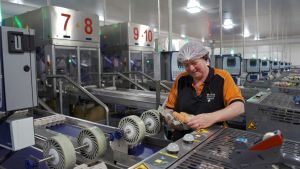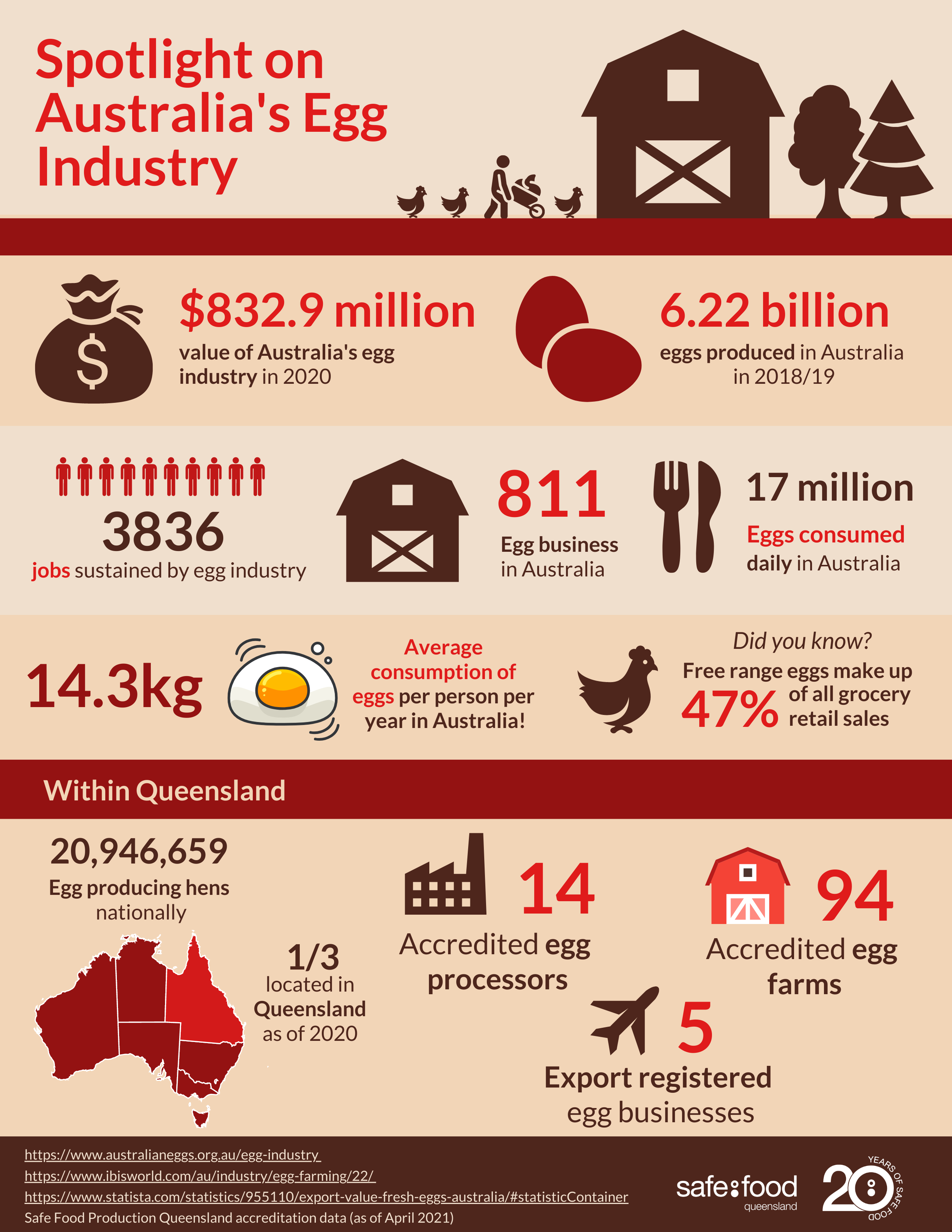Nutritious and delicious, eggs have become a staple in many Australians’ lives. Australian egg farmers produce 16.9 million eggs every day to feed the nation, which equates to 6.2 billion eggs each year! They’re simply trying to keep up with demand, with Australians consuming approximately 247 eggs per person per year (up from 221 just 6 years ago).
 The egg farming industry is made up of over 800 businesses across Australia that support more than 3,800 jobs. This includes a diverse range of businesses, from large vertically integrated farms that control rearing, production, grading, packing and transportation, to very small-scale farms that sell to local markets.
The egg farming industry is made up of over 800 businesses across Australia that support more than 3,800 jobs. This includes a diverse range of businesses, from large vertically integrated farms that control rearing, production, grading, packing and transportation, to very small-scale farms that sell to local markets.
Egg Farming Systems in Australia
There are four main egg farming systems used in Australia: free range, cage, barn-laid and organic.
Rising concerns from consumers regarding animal welfare have led to free range egg production growing significantly over the last 15 years. In 2018-19, free range and cage-free eggs accounted for 47% of all retail grocery sales. The industry has benefited from this switch, as non-caged eggs command higher prices and have greater profit margins.
However, there still remains a strong demand for cage and barn-laid eggs as an affordable source of high-quality protein (see table below). In 2018-2019, major supermarket egg sales were valued at $961.3 million.
Supermarket sales by farming system in FY2018-19
| Farming System | Sales Volume | Sales Value |
| Free range | 47% | 56% |
| Cage | 40% | 30% |
| Barn-laid | 11% | 11% |
| Specialty i.e. organic eggs | 2% | 3% |
Source: https://www.australianeggs.org.au/egg-industry
Queensland’s egg industry
In 2018-19, Queensland was the third largest egg producing state behind NSW and Victoria, accounting for 25% of total egg production in Australia.
Approximately 85% of Queensland eggs are produced in the Darling Downs region of southern Queensland. Other areas of the state where egg production occurs include:
- South East Queensland, including the Sunshine Coast hinterland where most production is small-scale, pasture-based free range farms
- North Queensland, from Townsville to the Atherton Tablelands
- Central Queensland, including the Mackay, Whitsundays, Rockhampton and Gladstone regions
- the Fraser Coast and Mary Valley regions.
Accredited egg businesses in Queensland
If you produce eggs in Queensland with the intent to sell or supply them for human consumption, then you must have an accreditation with Safe Food Production Queensland. This includes businesses of all sizes.
As of April 2021, Safe Food had:
- 14 accredited Egg Processors, including 4 that were registered to export
- 67 accredited Egg Producers (i.e. egg farms suppling to multiple outlets), with 1 registered for export
- 27 accredited Egg Producers operating under a Preferred Supplier Agreement (i.e. only supplying to one Processor exclusively).
 Safe Food also accredits Queensland schools that sell or supply eggs. For example, if they produce eggs as part of an agricultural program and then sell or supply them to parents, teachers, or the local community.
Safe Food also accredits Queensland schools that sell or supply eggs. For example, if they produce eggs as part of an agricultural program and then sell or supply them to parents, teachers, or the local community.
All eggs produced in Queensland must also have a unique stamp on the eggshell and carton. This unique identifier ensures that, in the event of a food safety incident or food poisoning outbreak, every egg can be traced back through the supply chain to the farm on which it was produced.
Safe Food’s online Egg Register can be used to search an egg stamp and determine the location of the farm.
For more interesting facts about Australia and Queensland’s egg industry, check out this Infographic:

